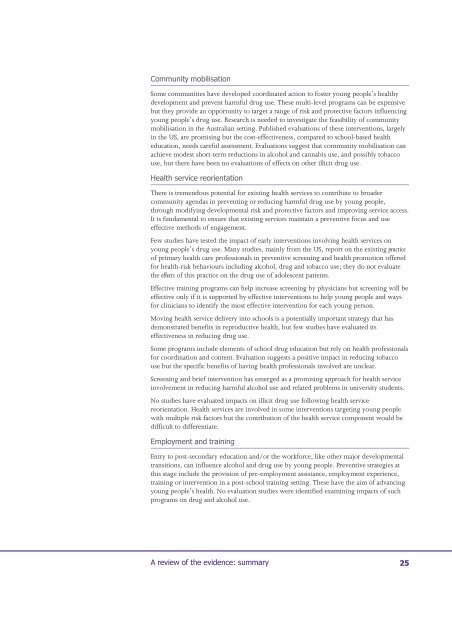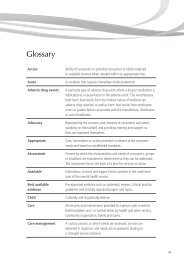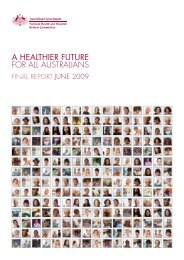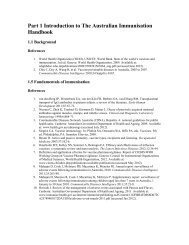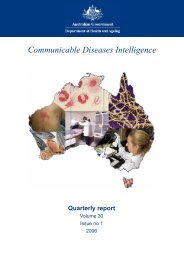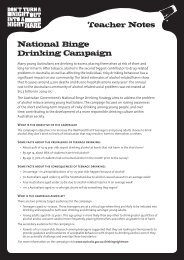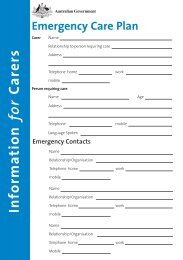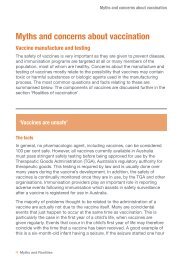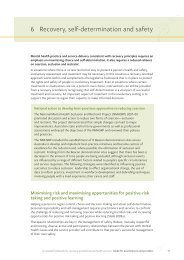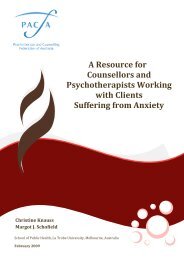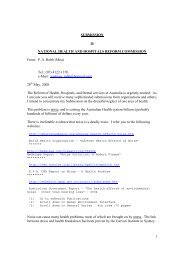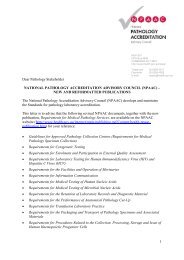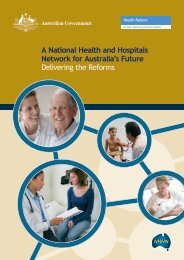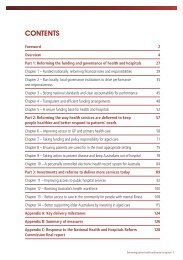Summary - Department of Health and Ageing
Summary - Department of Health and Ageing
Summary - Department of Health and Ageing
Create successful ePaper yourself
Turn your PDF publications into a flip-book with our unique Google optimized e-Paper software.
Some communities have developed coordinated action to foster young people’s healthy<br />
development <strong>and</strong> prevent harmful drug use. These multi-level programs can be expensive<br />
but they provide an opportunity to target a range <strong>of</strong> risk <strong>and</strong> protective factors influencing<br />
young people’s drug use. Research is needed to investigate the feasibility <strong>of</strong> community<br />
mobilisation in the Australian setting. Published evaluations <strong>of</strong> these interventions, largely<br />
in the US, are promising but the cost-effectiveness, compared to school-based health<br />
education, needs careful assessment. Evaluations suggest that community mobilisation can<br />
achieve modest short-term reductions in alcohol <strong>and</strong> cannabis use, <strong>and</strong> possibly tobacco<br />
use, but there have been no evaluations <strong>of</strong> effects on other illicit drug use.<br />
<br />
There is tremendous potential for existing health services to contribute to broader<br />
community agendas in preventing or reducing harmful drug use by young people,<br />
through modifying developmental risk <strong>and</strong> protective factors <strong>and</strong> improving service access.<br />
It is fundamental to ensure that existing services maintain a preventive focus <strong>and</strong> use<br />
effective methods <strong>of</strong> engagement.<br />
Few studies have tested the impact <strong>of</strong> early interventions involving health services on<br />
young people’s drug use. Many studies, mainly from the US, report on the existing practice<br />
<strong>of</strong> primary health care pr<strong>of</strong>essionals in preventive screening <strong>and</strong> health promotion <strong>of</strong>fered<br />
for health-risk behaviours including alcohol, drug <strong>and</strong> tobacco use; they do not evaluate<br />
the effects <strong>of</strong> this practice on the drug use <strong>of</strong> adolescent patients.<br />
Effective training programs can help increase screening by physicians but screening will be<br />
effective only if it is supported by effective interventions to help young people <strong>and</strong> ways<br />
for clinicians to identify the most effective intervention for each young person.<br />
Moving health service delivery into schools is a potentially important strategy that has<br />
demonstrated benefits in reproductive health, but few studies have evaluated its<br />
effectiveness in reducing drug use.<br />
Some programs include elements <strong>of</strong> school drug education but rely on health pr<strong>of</strong>essionals<br />
for coordination <strong>and</strong> content. Evaluation suggests a positive impact in reducing tobacco<br />
use but the specific benefits <strong>of</strong> having health pr<strong>of</strong>essionals involved are unclear.<br />
Screening <strong>and</strong> brief intervention has emerged as a promising approach for health service<br />
involvement in reducing harmful alcohol use <strong>and</strong> related problems in university students.<br />
No studies have evaluated impacts on illicit drug use following health service<br />
reorientation. <strong>Health</strong> services are involved in some interventions targeting young people<br />
with multiple risk factors but the contribution <strong>of</strong> the health service component would be<br />
difficult to differentiate.<br />
<br />
Entry to post-secondary education <strong>and</strong>/or the workforce, like other major developmental<br />
transitions, can influence alcohol <strong>and</strong> drug use by young people. Preventive strategies at<br />
this stage include the provision <strong>of</strong> pre-employment assistance, employment experience,<br />
training or intervention in a post-school training setting. These have the aim <strong>of</strong> advancing<br />
young people’s health. No evaluation studies were identified examining impacts <strong>of</strong> such<br />
programs on drug <strong>and</strong> alcohol use.


